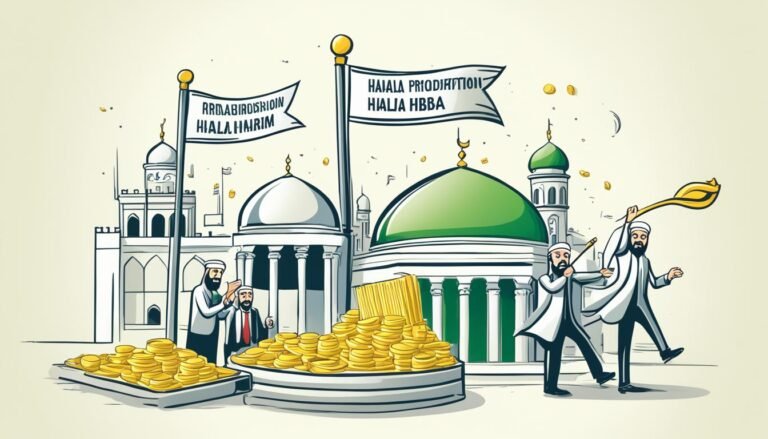The Future of Islamic Finance: Opportunities and Challenges
As the global economy changes, a big question is: Can Islamic finance change the future of investment and growth? It looks into the special rules of Islamic finance. These rules make sure it follows Sharia-compliant banking and draw in more investors from around the world. The industry is set to grow thanks to more Muslims with money in 2030, offering a rich mix of opportunities and challenges.
Islamic finance is expected to grow by high-single digits in 2024 and 2025, after a strong 8% growth last year. The United Arab Emirates is seeing fast growth thanks to a strong economy not based on oil. But, there are still big challenges like rules and market size that make it hard to move forward.
Key Takeaways
- The global Islamic finance industry expects high-single-digit growth for the next two years.
- Saudi Arabia led the growth in the industry in 2023, making up 56.7% of it.
- The sukuk market could reach up to $170 billion in 2024 for investment opportunities.
- The takaful sector is expected to grow about 10% each year.
- Big challenges like legal and regulatory issues could slow down the market’s full growth.
Introduction to Islamic Finance
Islamic finance is a special part of the financial world. It follows Sharia law to ensure it’s ethical. This means it focuses on ethical investing and sharing risks, not on making a lot of money. It also avoids things like interest and too much risk.
This type of finance includes many financial activities and products. They all follow Sharia principles. This makes it a unique choice compared to regular finance.
Definition and Principles of Islamic Finance
Islamic finance is more than just saying no to certain things. It has core principles:
- Risk-sharing: It’s not all about making as much money as possible. Islamic finance is about sharing risks and rewards.
- Ethical investment: You can’t invest in things that are considered haram, like alcohol or gambling.
- Asset-backed financing: All financial deals must be based on real assets and economic activities.
These rules help create financial products that are both ethical and trustworthy. This builds trust in the transactions.
Global Growth of the Islamic Finance Industry
Islamic finance has grown a lot worldwide, even when times were tough. It’s expected to keep growing at a rate of 8.5% each year for the next ten years. By 2007, Sharia-compliant assets reached $500 billion, with over 300 Islamic financial institutions in more than 75 countries.
This shows that more and more Muslims are looking for ethical financial options. They want to make sure their money is used in ways that match their beliefs.
Current Trends in Islamic Finance
The world of Islamic finance is always changing. It’s shaped by many factors that help it grow and change. Looking to 2024, we see big trends in banking and Sukuk issuances. These trends show how the industry is moving, especially with digital changes in Islamic finance.
Key Islamic Finance Trends in 2024
One big trend is the expected growth of Islamic finance assets to about $3.472 trillion by 2024. Sukuk issuances are set to hit between $160 billion and $170 billion. This shows how strong this financial area is. The focus on Shariah principles keeps pushing investments towards ethical choices, making Islamic finance a strong choice worldwide.
Impact of Digitalization on Islamic Finance
Digital changes have changed how Islamic banking works, making it more efficient and easy to use. Fintech has helped bring more people into the financial system, making things clearer and smoother. But, the capital markets are still catching up with digital solutions, especially in tokenization. Some Islamic banks are moving forward, but a lack of global standards is holding back wider digital use. This is something that everyone in the finance world needs to think about.
The Future of Islamic Finance: Opportunities and Challenges
The world of Islamic finance is changing fast, offering many chances in Sharia-compliant banking and the Sukuk market. More people want ethical financial options, leading to new ideas and investment chances. As countries change their economies, they need different financial services. This creates a great chance for Sharia-compliant banking.
Emerging Opportunities in Sharia-Compliant Banking
In places like Saudi Arabia, Islamic banks are growing because people need ethical money solutions. This kind of finance fits with the world’s move towards sustainable and socially responsible investing. The UAE’s strong non-oil economy is helping Islamic finance grow, showing how strong and flexible this sector is.
Investment Opportunities in the Sukuk Market
The Sukuk market is expected to grow a lot, possibly reaching $160 billion to $170 billion in 2024. This growth means more institutions are using Sukuk for refinancing, focusing on long-term financial plans. Even with these good signs, there are still challenges. Investors face issues with Sukuk products that could change how they invest.
Growth Prospects of Islamic Finance
The growth of Islamic finance looks bright, thanks to a growing need for Sharia-compliant financial products worldwide. The Gulf Cooperation Council (GCC) countries are leading this growth. They are key players in the Islamic finance sector. Investors and financial institutions are keeping a close eye on these developments.
Forecast for the Global Islamic Finance Market
Islamic finance is expected to keep growing, with a 10% annual growth rate from 2016 to 2021. This shows more people want Islamic banking and finance solutions. Younger people are looking for ethical investment options, which helps the market grow.
There’s also a big interest in sustainable finance worldwide. This interest makes the market even more appealing for different financial products.
Regional Dynamics: The Role of GCC Countries
The GCC countries are very important for Islamic finance’s growth. In 2023, they made up 86% of the sector’s asset growth. Saudi Arabia’s Vision 2030 is a big push to diversify the economy and increase financial inclusion.
Islamic banking is getting bigger in this region. Financial institutions are introducing new Sharia-compliant products. This is making Islamic finance more accessible to people.
| Year | CAGR (%) | Key Market Driver |
|---|---|---|
| 2016-2021 | 10 | Increasing demand for ethical investments |
| 2023 | N/A | Vision 2030 initiative in Saudi Arabia |
| 2028 (Forecast) | N/A | Growth in alternative investment markets |
Islamic Finance Industry Analysis
The Islamic finance industry has grown a lot, like a young industry growing fast. It’s seen big growth in areas like banking and capital markets. Over the last ten years, we’ve seen a lot of changes. These changes show how strong and flexible the sector is, even when the economy changes a lot.
Asset Growth and Market Segments
Recent Islamic finance industry analysis shows that banking is a big part of the growth, making up about 56% in 2023. The sukuk market is doing well, even with some challenges. It’s important for helping governments and companies get funding.
The takaful sector, which is Islamic insurance, is also growing. But it’s still much smaller than banking. The funds sector is growing, but it needs more work to get more people to use it.
| Market Segment | Growth Contribution (%) | Comments |
|---|---|---|
| Islamic Banking | 56 | Dominates asset growth in the industry. |
| Sukuk | 22 | Resilient performance amid challenges. |
| Takaful | 15 | Shows significant potential for growth. |
| Funds | 7 | Requires further development for broader appeal. |
The asset growth in Islamic finance keeps bringing new ideas and products. This makes the sector more attractive to more people. It’s important for staying competitive in the financial world.
Challenges Facing the Islamic Finance Sector
The Islamic finance sector faces many challenges that slow its growth and make it less efficient. These issues show how hard it is to keep a financial system that follows Islamic rules.
Legal and Regulatory Hurdles
Islamic finance has big legal problems that stop it from growing. Getting clear rules is a big worry. Countries have different rules, causing confusion and making it hard to follow them.
Existing rules can be very complex. This means Islamic finance must always change to keep up with new ideas, like those from the AAOIFI. These changes can cause problems and might make less developed areas less active. Islamic finance also struggles with building a strong legal and institutional setup. This is needed for things like accounting, supervision, and being a last resort lender.
Market Concentration Risks and Geographical Limitations
Most Islamic banking is in a few countries, mainly in the Gulf Cooperation Council (GCC) states. This makes the sector very vulnerable to economic ups and downs. Big banks from around the world are now in Islamic banking, making things more competitive.
Islamic banks need to work together and merge to stay ahead. Most of their customers are in the Gulf states. This might mean they ignore other areas that need their services. It’s very important to make more people understand Islamic finance and its products.
Capitalizing on Islamic Finance Investment Opportunities
In Islamic finance, making the most of investment chances means knowing the market well and sticking to ethical ways to invest. The sector is growing fast, showing a big need for new solutions that follow Sharia rules.
Strategies for Investors and Stakeholders
Investors and stakeholders need smart strategies to grow in Islamic finance. Important strategies include:
- Diversification of portfolios: Mixing Sharia-compliant assets like Sukuk and Islamic equity funds spreads risk and can increase returns.
- Engagement with industry experts: Working with experts in finance ensures investments follow Islamic rules, which can lead to better results.
- Focus on sustainable investments: Investing in sustainable businesses meets ethical standards and attracts socially aware investors.
Role of Technology in Enhancing Investment Platforms
Technology is key to improving Islamic finance investment chances. New tech can fill service gaps and make things more efficient in Islamic financial institutions. By using new solutions, these institutions can:
- Streamline operations: Better software cuts costs, letting institutions use their resources better.
- Attract a diverse clientele: Making user experiences better draws in investors who want modern, easy-to-use platforms.
- Support compliance: Advanced systems for Islamic finance help keep transactions legal and make operations smooth.
The Islamic finance industry is growing, and using technology brings many benefits. By using smart investment strategies and new tech, investors can find big growth in a changing financial world.
Sustainability and Future Innovations in Islamic Finance
Islamic finance is becoming a key player in the push for sustainable development. It offers more than just financial gains; it also brings positive changes to society. This approach can help fund projects and protect communities in a unique way.
Aligning Islamic Finance with Sustainable Development Goals
Global efforts are boosting awareness of Islamic finance’s role in reaching the UN’s Sustainable Development Goals. It’s seen as a key player in socially responsible development. Case studies show how it can fund projects that protect the environment and boost economies.
Innovative Products and Services on the Horizon
New advancements in Islamic finance focus on what customers need and use technology. At the 15th International Conference on Islamic Economics and Finance, experts talked about how AI and virtual banking will shape the future. Institutions like the Islamic Development Bank and UNDP are exploring new areas, including Takaful and green financing.
| Innovative Areas | Description |
|---|---|
| Green Sukuk | Debt instruments specifically for financing environmentally projects and initiatives. |
| Socially Responsible Investments | Investment strategies focused on ethical and sustainable enterprises. |
| Takaful Innovations | Advancements in mutual insurance schemes that support community welfare. |
| AI and Virtual Banking | Integration of cutting-edge technology to enhance customer experience and operational efficiency. |
The future of Islamic finance looks bright, with big potential for sustainability. By focusing on ethical investments and new financial products, the industry is set to adapt and grow in a changing world.
Conclusion
The future of Islamic finance is bright, with big opportunities and challenges. It’s built on ethical values and is growing worldwide. Now, Islamic banking makes up over 20% of banking assets in many places.
Organizations face big challenges, like legal and regulatory issues. They need to plan carefully and work together. The rise of fintech, with over 2,000 startups, shows the need for tech integration. This keeps the industry competitive and relevant.
The industry is set to adapt to the changing finance world. It aims to offer inclusive and responsible financial solutions. The success of Islamic finance depends on tackling challenges and seizing new opportunities. This will create a strong and lasting financial framework.
Source Links
- Islamic Finance 2024-2025: Resilient Growth Anticipated Despite Missed Opportunities
- Islamic finance can address barriers to achieve SDGs says IFAC, MIA, and World Bank in new report
- Funding the energy transition: the role of Islamic finance | White & Case LLP
- No title found
- Islamic Finance in the Era of Financial Technology: A Bibliometric Review of Future Trends
- Business trends & challenges in Islamic FinTech: A systematic literature review
- Islamic Digital Finance: Opportunities & Challenges
- Insights
- The Islamic Finance Industry: Issues and Challenges
- No title found
- Microsoft Word – Challenges Facing Islamic Banking in the 21st Century.docx
- Challenges in Islamic finance
- Islamic Sustainable Finance: Opportunities for Donors and PAOs to Deliver Sustainable Development Goals
- Islamic Finance has great potential, but is being held back by technology
- Islamic Finance and Sustainability
- Exploring Innovations in Islamic Finance: A Path Towards Sustainable Development
- Islamic finance as a driver for enhancing economic sustainability and innovation in the GCC
- The Rise of Islamic Finance
- Muhammad bin Ibrahim: Future of Islamic finance – delivering actions today for a sustainable tomorrow







